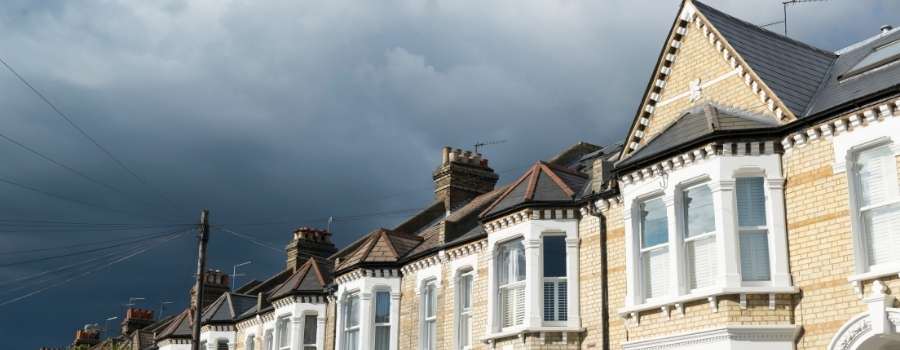
In a perfect world, solar panels would be impervious to the elements. But we all know that the real world is far from perfect. Solar panels typically live on the roof, so it only makes sense that they will have to deal with the elements…but can they withstand a lightning strike?
In general, both direct and indirect lightning strikes can cause downtime and possible damage. while also leading to the need for new parts or components. Luckily, most strikes hit the ground first and then run up to the panel.
The good news is that solar panels are designed to withstand harsh weather, including lighting. But there are always extra precautions you can take to make sure your investment stays in good shape, more on this below…
Table of Contents
Impact of Lightning on Solar Panels
Direct Effects
When lightning directly strikes a solar panel, the immediate impact can be catastrophic. Solar panels, consisting primarily of silicon cells, are vulnerable to the intense thermal and electrical energy of a strike.
This can result in physical damage to the cells, such as melting or shattering, rendering the panel inoperable.
According to the IEEE, the immense electrical current from a direct strike can exceed the withstand capacity of the solar cells, causing irreversible damage (1).
Indirect Effects
More commonly, solar panels experience indirect effects from nearby lightning strikes. These effects include electrical surges that travel through the power system.
The sudden spike in voltage can overwhelm the inverter and other electrical components connected to the solar panels.
The National Renewable Energy Laboratory (NREL) notes that these surges can degrade the efficiency of solar panels over time, even if no immediate damage is visible (2).
Case Studies or Real-Life Examples of Solar Panels Hit by Lightning
Residential Solar Panel Strike
In Florida, a residential solar panel system was struck, resulting in a fire that damaged the roof and the solar array. The investigation revealed that the lack of a proper grounding system contributed to the severity of the damage.
Solar Farm Incident
A large solar farm in Germany experienced a nearby strike that induced a surge in the grid. Multiple inverters were damaged, and the farm’s output was significantly reduced for weeks. The incident highlighted the vulnerability of large-scale solar installations to lightning-induced surges.
Damage Typically Caused by Lightning (e.g., Electrical Surges)
Physical Damage
- Burnt cells and cracked glass surfaces.
- Melted junction boxes and conductive traces.
- Structural damage to the mounting and housing.
Electrical Damage
- Burnt out inverters due to voltage surges.
- Deterioration of electrical insulation in wiring.
- Compromised efficiency of energy conversion.
Long-term Effects
- Gradual degradation of panel efficiency.
- Increased susceptibility to further electrical issues.
- Shortened lifespan of the solar panel and associated components.
While direct lightning strikes to solar panels are rare, their impact can be devastating. More frequently, the indirect effects of nearby strikes pose a significant risk.
The damage from these events, especially electrical surges, underscores the importance of adequate protection measures for solar energy systems.
Protective Measures for Solar Panels
Lightning Rods and Air Terminals
For solar installations, lightning rods or air terminals are often installed at strategic points. These rods provide a direct path for the charge to reach the ground, bypassing the solar panels and associated equipment.
Conductive Mesh Systems
Another approach involves integrating a conductive mesh over the solar panel array. This mesh acts as a Faraday cage, distributing the electrical charge over a larger area and reducing the direct impact on any single point.
The Role of Grounding in Solar Panel Setups
- Grounding Systems: Effective grounding is crucial for solar installations. It ensures that in the event of a lightning strike, the electrical surge has a safe path to the earth (3).
- Grounding Electrodes and Conductors: Grounding electrodes are installed deep into the ground and connected to the solar system via conductors. These conductors must be of adequate size and material to carry the current without overheating or breaking.
Advanced Technologies in Lightning Protection
- Surge Protectors: Surge protectors are essential for safeguarding the electrical components of solar installations. These devices, when installed at critical points like the inverter inputs, can absorb or redirect the excess voltage away from the equipment.
- Conductive Microgrid: Innovative technologies like conductive microgrids integrate protection directly into the solar panel layout. This approach involves creating a network of conductive paths that can safely channel energy.
- Energy Storage Considerations: For systems with energy storage, additional protection is required to safeguard the batteries and storage components. This often involves specialized surge protection devices that are designed to handle the unique characteristics of storage systems.
Frequently Asked Questions
Do solar panels attract lightning?
Solar panels do not attract lightning. Lightning strikes are caused by natural atmospheric conditions. However, solar panels can be struck if they are installed in area known for bad weather.
Do I Need A Surge Protector For My Solar Panels
Having a surge protector for your solar panels is highly recommended since they help reduce the risk of lightning damage to solar panels by absorbing some of the energy from a strike before it reaches the solar panel.
Should Solar Power Be Turned Off During A Lightning Storm
In most situations, you don’t need to turn off your solar power system during a lightning storm since the majority of systems are designed to automatically disconnect from the power grid in emergency situations.
Are solar panels safe during a thunderstorm?
Generally, solar panels are safe during a thunderstorm, especially if equipped with proper lightning protection measures like grounding systems and surge protectors.
Is grounding necessary for all solar panel installations?
Yes, grounding is essential for all solar panel installations as per the National Electrical Code. It provides a safe path for electrical surges to dissipate into the earth.
How often should I inspect my solar panel’s lightning protection system?
Regular inspections, at least annually, are recommended to ensure that all components of the lightning protection system are functioning correctly. After a major storm, a thorough inspection is advisable.

